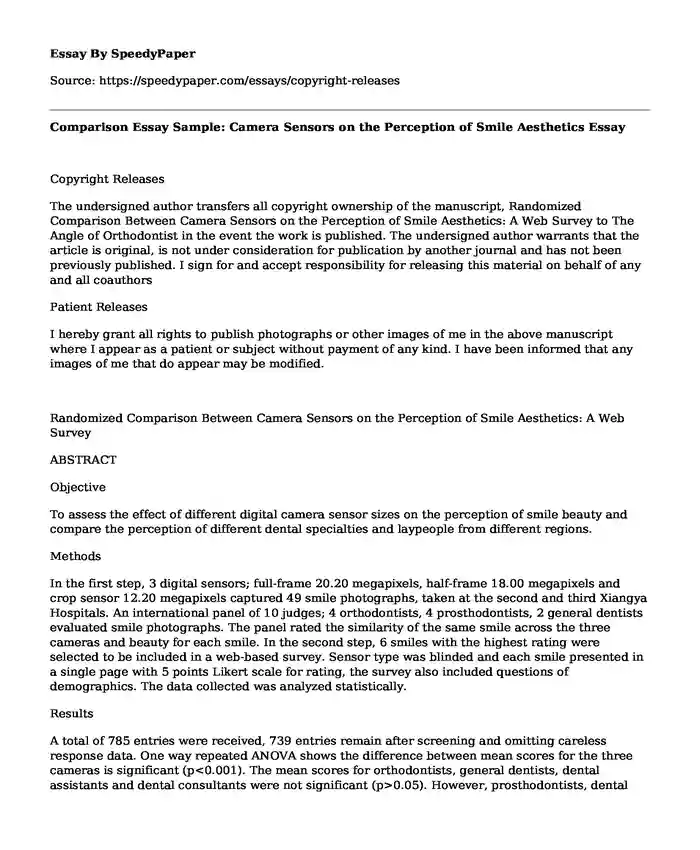
| Type of paper: | Essay |
| Categories: | Dentistry Technology |
| Pages: | 3 |
| Wordcount: | 746 words |
Copyright Releases
The undersigned author transfers all copyright ownership of the manuscript, Randomized Comparison Between Camera Sensors on the Perception of Smile Aesthetics: A Web Survey to The Angle of Orthodontist in the event the work is published. The undersigned author warrants that the article is original, is not under consideration for publication by another journal and has not been previously published. I sign for and accept responsibility for releasing this material on behalf of any and all coauthors
Patient Releases
I hereby grant all rights to publish photographs or other images of me in the above manuscript where I appear as a patient or subject without payment of any kind. I have been informed that any images of me that do appear may be modified.
Randomized Comparison Between Camera Sensors on the Perception of Smile Aesthetics: A Web Survey
ABSTRACT
Objective
To assess the effect of different digital camera sensor sizes on the perception of smile beauty and compare the perception of different dental specialties and laypeople from different regions.
Methods
In the first step, 3 digital sensors; full-frame 20.20 megapixels, half-frame 18.00 megapixels and crop sensor 12.20 megapixels captured 49 smile photographs, taken at the second and third Xiangya Hospitals. An international panel of 10 judges; 4 orthodontists, 4 prosthodontists, 2 general dentists evaluated smile photographs. The panel rated the similarity of the same smile across the three cameras and beauty for each smile. In the second step, 6 smiles with the highest rating were selected to be included in a web-based survey. Sensor type was blinded and each smile presented in a single page with 5 points Likert scale for rating, the survey also included questions of demographics. The data collected was analyzed statistically.
Results
A total of 785 entries were received, 739 entries remain after screening and omitting careless response data. One way repeated ANOVA shows the difference between mean scores for the three cameras is significant (p<0.001). The mean scores for orthodontists, general dentists, dental assistants and dental consultants were not significant (p>0.05). However, prosthodontists, dental technicians, and laypeople mean scores were significant (p<0.05). The mean scores from Middle East region was significantly lower compared to mean scores from Greater China region (p<0.001). In the Laypeople group, female mean scores were significantly higher compared to males mean scores (p<0.05). Education level and income level factors were however not significant (p>0.05).
Conclusion
Sensor size has an effect on perception of smile beauty, hence, a larger sensor is recommended for dentists when esthetic factor is in mind.
Dentists of dissimilar specializations such as the prosthodontics, orthodontics, and general dentist) might have different immanent opinions regarding the beauty smile. Region and gender affects the perception of smiles esthetic for the laypeople.
Keywords:
Digital photography; smile beauty; digital sensors; web survey.
Classification: R783.5.
Introduction
Facial attractiveness plays an important role in interpersonal connections; this has led to the increasing number of patients seeking assistance of dentists for esthetic reasons. While more patients seek dental clinic for aesthetic reasons, it is the dentists job to attend to patients needs and expectations. Since the invention of the modern camera, the rapid technological advancement and wide use of the internet, the use of the camera in dental clinic became more and more important. Dental Photography becomes more than just a diagnostic and legal tool. Images become a necessary tool for treatment planning, publication and teaching, demonstration and promotion. The camera is an important part of an orthodontists clinic and the proper selection of camera and camera equipment is as equally important.
Photography in dentistry
At the beginning of the first century, Dr. Edward Angle, one of several men credited for being the father of orthodontics, was the first known to photograph his patients as part of his diagnostic workup. Dr. Edward Angle used photography for diagnosis, treatment planning, and patient documentation. Since then orthodontists and other dental specialists started incorporating photography into their daily dental practice.
Today, it is a standard practice to take facial and intraoral photographs of patients as part of initial diagnostic records and at the conclusion of orthodontic treatment in orthodontics. Several textbooks for dentistry have discussed the importance of photography in diagnosis and documentation, furthermore, there are textbooks devoted entirely to dental photography.
One of the main purposes of dental photography is documentation. This means that a maximum of information has to be captured by camera under reproducible circumstances. The American Board of Orthodontics and the Institute of medical illustration in England set standardized guidelines for photography in orthodontics.
Cite this page
Comparison Essay Sample: Camera Sensors on the Perception of Smile Aesthetics. (2019, Nov 20). Retrieved from https://speedypaper.net/essays/copyright-releases
Request Removal
If you are the original author of this essay and no longer wish to have it published on the SpeedyPaper website, please click below to request its removal:
- Free Essay on the Role of the Nurse Practitioners in Promoting Quality and Safety in the U.S
- Essay Example: Meaning and Importance of Strategy
- Free Essay for Students: Food Stamp Act of 1977 and Homelessness
- Free Essay Considering Brexit as a Social Problem
- Position Paper Sample on Homeland Security Department and Terrorism Issue
- The Van Cortlandt Park, Tourism Essay Example for Students
- Essay Sample on China's Attitude Towards COVID-19
Popular categories




